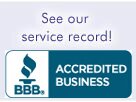 Rightway Auto Glass 8573 Jefferson Hwy. Maple Grove, MN 55369 (763) 420-7014 10430 Excelsior Blvd Hopkins, MN 55343 (952) 933-1878 1301 Cliff Road Suite 47 Burnsville, MN 55337 (952) 934 - 5526 |
Glass Industry News NGA Accredited AGRSS Accredited BBB Accredited PPG Prostar Select We can handle all your auto glass needs!    Testimonial "I just wanted to thank you for your service on my windshield. It looks great and the work is excellent. Your service was greatly appreciated!" |
||
Ford OEM vs Aftermarket Parts: Which One is Right for Your Vehicle?Introduction If you're searching for the best way to keep your car running in top condition, you need to make a crucial decision: should I use Ford OEM or aftermarket parts? Let's explore the differences between these two options and their respective pros and cons so that you can make an informed choice. With this knowledge, your vehicle will be able to remain dependable and functioning optimally for much longer! What are OEM and Aftermarket Parts?Before exploring the benefits and drawbacks of Ford Original Equipment Manufacturer (OEM) versus aftermarket parts, let's begin by clarifying their definitions. OEM stands for Original Equipment Manufacturer, meaning that the parts are engineered and produced by the same manufacturer as your vehicle. Ford-OEM parts fit perfectly to function just like those components which were originally installed on your vehicle when it was first constructed; so you can trust that they will work seamlessly with one another! As an alternative, aftermarket parts are manufactured by external vendors. These components offer a universal fit for many vehicles at discounted prices compared to Original Equipment Manufacturer (OEM) parts. Advantages of Ford OEM PartsThere are several advantages to choosing Ford OEM parts for your vehicle:
Disadvantages of Ford OEM PartsWhile Ford OEM parts can offer many perks, it is important to be aware of their potential drawbacks as well.
Advantages of Aftermarket PartsAftermarket parts provide multiple benefits that might make it the best choice for you, including:
Disadvantages of Aftermarket PartsHowever, there are also some drawbacks to utilizing aftermarket parts:
How to Choose the Right Parts for Your VehicleWhen choosing between Ford OEM and aftermarket parts, there are several points to take into account before making your decision.
Ultimately, the choice between Ford OEM and aftermarket parts will come down to your individual situation and preferences. Frequently Asked Questions (FAQs)Q: Are aftermarket parts just as good as OEM parts? A:The quality of aftermarket parts varies depending on the specific part and manufacturer. Some are able to replicate OEM performance, while others may not be up to standard. Q: Do aftermarket parts void my vehicle's warranty? A: While aftermarket parts do not inherently annul your vehicle's warranty, if a non-OEM part causes any issues, the manufacturer may deny coverage. Q: Can I install aftermarket parts myself? A: While some aftermarket parts can be installed by the vehicle owner, others may necessitate an experienced professional. Conclusion Selecting between Ford Original Equipment Manufacturer (OEM) and aftermarket parts can be a tough decision, as there are pros and cons to each. While OEM components provide greater quality assurance and dependability at the expense of higher cost points and limited availability, aftermarkets generally offer lower pricing but have variable reliability. When it comes to picking between aftermarket and original equipment manufacturer (OEM) parts, the ultimate decision relies on your specific needs. To make an informed choice, you should evaluate factors such as your budget capacity, how long or far you plan to drive with the part in question, and which one offers better warranty coverage that aligns with your quality expectations. Aftermarket parts cost less than OEM ones but may not fit or function properly; thus assessing these variables is of paramount importance for a timely purchase of reliable components. |
|||


